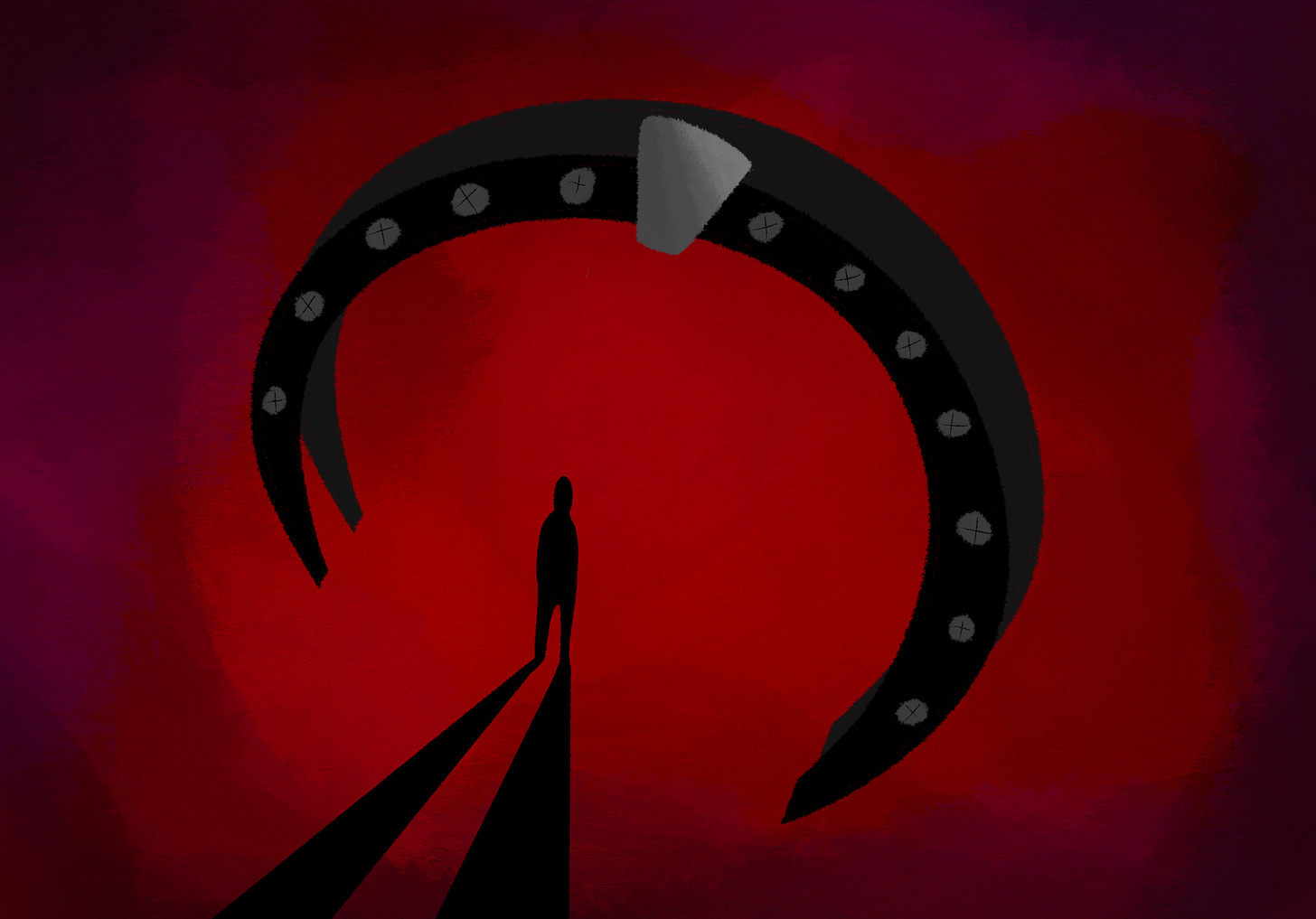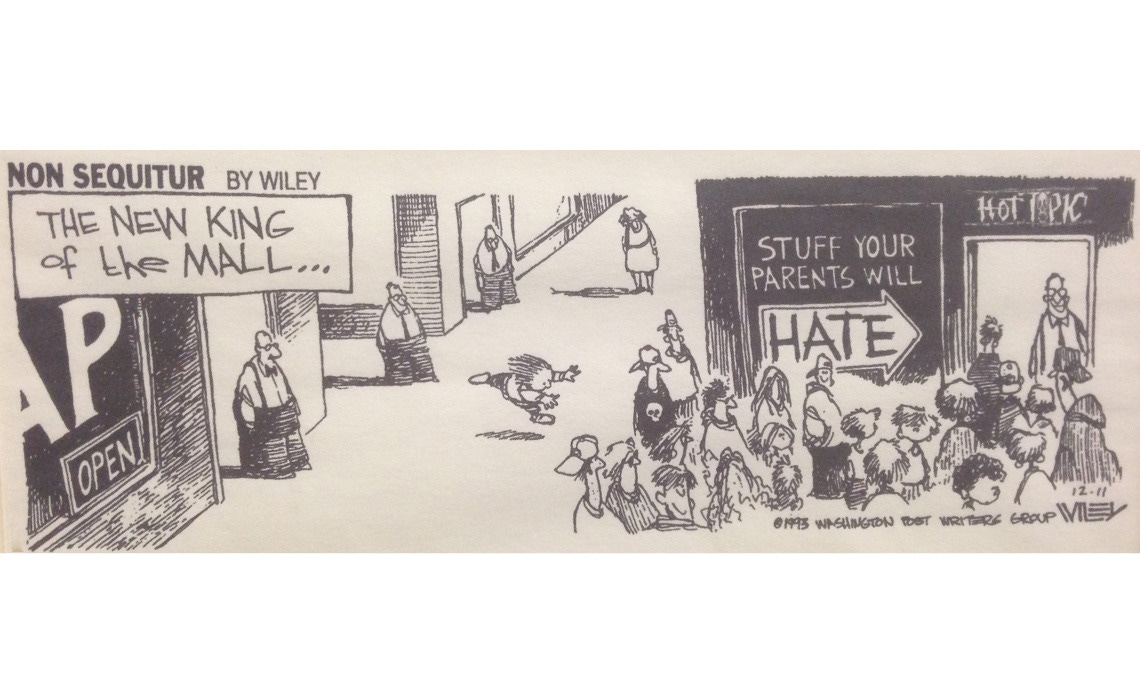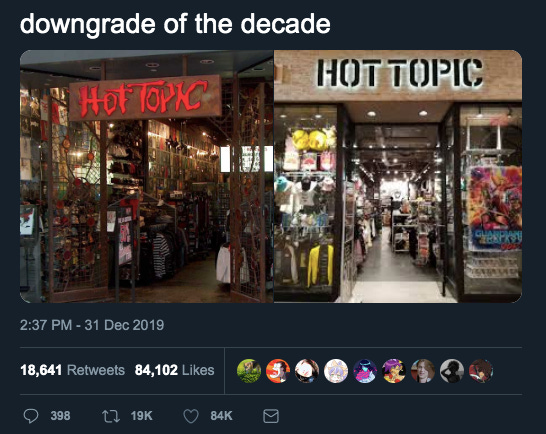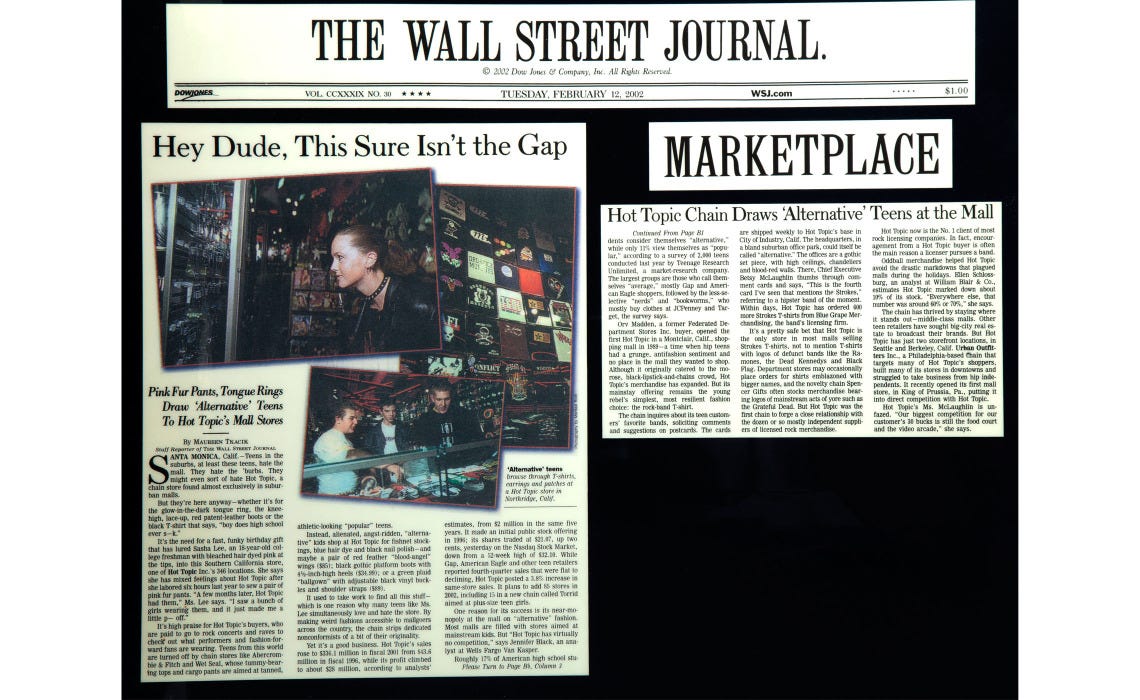
As a moody high school freshman in 2005, few places offered such respite from the wretched banality of the world as the dark, deafening interior of Hot Topic. There, employees wore thick eyeliner regardless of gender and the merchandise made gleeful mockery of the very notion of wholesomeness—see a Care Bear tee buttressed by zombies and The Insane Clown Posse. One would enter Hot Topic through a portal of sorts, a distinct, circular gateway. It all served to send a message: Here is your world, dull and oppressive, turned on its head.
And in 2005, the world deserved it. We were in the immediate post-9/11 years, in the dregs of the Bush era where Dubya, a caricature of folksy, American ignorance, would sporadically occupy our TV screens to deliver updates on the invasion in Iraq, a product of the corruption and incompetence of “adults.” This was fertile ground for punk culture, which thrives under the crushing darkness of authoritarianism. Green Day’s “American Idiot” crystallized the sentiment: “Well maybe I'm the f*ggot America / I'm not a part of a redneck agenda.”

Hot Topic didn’t generate this culture so much as capitalized on it and catered to it, being a retail enterprise and all. But it did proliferate the goth, punk ethos (combined here for simplicity’s sake) to parts of the country that wouldn’t have been able to access it so easily, like my neck of the woods in rural Oklahoma where “mall goth culture” was a massive hit. And anyway, as a kid it’s not like I was contemplating sociocultural movements’ relationships to capitalism. I was buying spikes and jelly bracelets because these items signposted my truth: I am different, and I object.
I object to the hierarchy. I object to suburbia. I object to the American Dream and its suffocating normalcy. I will mold myself into a prickly, jagged being with spikes and chains to sabotage the machine—I won’t let you process me, let you look me over and determine my worth. I choose instead to self-destruct. I choose to flunk the test. I will dress myself in black and cover my face in makeup so that you have no choice but to dismiss me, which is what I want because this keeps my nuances, my depths, safe from your prying eyes, from America. I don’t care, man.
Such was the power I felt a studded belt could grant me.
So why does this matter? Sure, pre-teens are rebellious. That’s kind of their thing. Punk culture wasn’t invented under George W. Bush, and indeed some diehards would argue the Bush-era iteration of it presented a diluted, watered down version of the dissent seen under Reagan. We’ve since seen social movements ebb and flow, and some of the touchstones, like Ferguson and Standing Rock, formally greeted us former teen rebels into the harsh realities of what actual resistance looked like.
But gauging the efficacy of Green-Day-style contrarianism isn’t super important to me, nor is digging into how much of early aughts punk culture was artifice and how much of it reflected a genuine desire to challenge authority. I remain more interested in Hot Topic here, how its trajectory reflects my own, and what its shift in marketing and aesthetics has to tell us about the world we live in today.

Today, Hot Topic has been facetuned. It is smooth. It no longer has its iconic portal, and it no longer blasts the music that kept many a suburban parent at bay. It’s spiritually more of a Funko Pop distributor than, say, a Victorian corset maker for sad, hot goth girls. It’s the difference between Invader Zim and Rick and Morty. It’s a shift to catering to geek culture, Bronies and Marvel fans and the like, and while Hot Topic has always had a geeky kick, its personality change is palpable to anyone who considered it a hub in the 00’s.
From the beginning, Hot Topic has been a commercial reflection of America’s young outcasts, and the message we can glean from the present is clear. Today’s “losers,” the alternative bunch, are into superheroes, KPOP, and whatever this is. Popular Gen-Z artists like Billie Eillish are spiritual successors to the jelly bracelet crew and carry on its noble cause, but all in all, Hot Topic is still a far cry from, well, this. I’m not saying it’s a bad thing or a good thing, but it is a thing, and public opinion on it is mixed.
While looking to collect samples, I came across this “what happened to Hot Topic” Reddit thread that held some interesting sentiments. “Their niche seems to be alternatizing non-alternative things (think slutty tank top with The Little Mermaid on it),” writes one clever Redditor. “They really make their bread and butter catering to fandoms of everything from Doctor Who to Marvel to Supernatural.”
That sounds about right to me. Hot Topic has always been about making acceptable mockery of whatever is mainstream at the moment. It provides a fun little twist to popular IPs, giving the alternative kids, the rebels, and the punks their portal into pop culture. That, to me, articulates well the tricky paradox of being an angsty teen: “Don’t look at me!” I would scream at the top of my lungs. “I don’t want to be seen! I’m different!” All in a desperate bid, in fact, to be seen. It’s a sentiment that’s still alive and well. But I do miss the way it articulated itself back then.

We’re in an epoch where punk culture has an easy target. Present conditions are what sparked my Hot Topic nostalgia in the first place for how eerily they echo 2005. But for me, one of the “adults” now, I see in present day Hot Topic a reflection of my own journey. My technology, the apps I use, my life, they’ve all been streamlined. The teens are still teens, thank goodness. But me, well, everything is a neat, clean, scrolling timeline of horrors. The robots speak softly to me when fulfilling my requests: “How can I help you? Okay, I’m looking that up now.”
I feel this stream, this optimized river of information—Twitter, Facebook, Venmo, Apple Credit, the algorithm—is slowly sanding away my edges and smoothing me out. Is it any wonder that I would, for better or worse, come to look fondly on the Motorola RAZR days of wandering the mall with empty pockets? I miss the exquisite corniness of quoting lyrics in away messages on AOL Instant Messenger, back when I didn’t have to worry about being screenshot and mocked by thousands of strangers online for being too earnest. I miss angst itself, angst being the sort of thing you can only really generate when you haven’t yet decided you’ve been defeated, a resolve to buck and struggle.
Nostalgia is silly that way. I didn’t think I was doing anything terribly fulfilling back then, and indeed, I probably wasn’t. The world as it exists today affirms this. I wasn’t part of any real movement to sabotage anything. I was wearing eyeliner.
So we didn’t topple anything. So we didn’t stop the “redneck agenda” or whatever. So we grew up, and we grew in: into the way things are, into a late capitalist nightmare world where we feel lonely and sad and clean, everything shiny, everything smooth, everything hurtling frictionlessly into oblivion. Our words are measured. Our brains are poisoned with irony. Goodness, what happened?
I know better than to pretend that the past was good and the present is bad. Nothing is binary in that way. The kids are kids, and they give me hope. The world goes on. Hot Topic continues to be a store, selling things and making money as stores do, and apparently doing it well enough to survive, probably because they changed. That’s fine. I get it.
But I do feel nostalgic for the baroque honesty of the Hot Topic I grew up with, for the profound sense of purpose a studded leather cuff could give me, before everything got so damn smooth—our MySpace profiles were cluttered, blinkering hellmouths of personality, our clothes were dramatic, jingly-jangly armor against the world, and Hot Topic was our mothership, a chaotic limbo that opened its gates just for us.
I know I shouldn’t romanticize it. But sometimes, here and there, it’s nice to indulge flights of fancy and not apologize. That was the best part of those days, for me.



